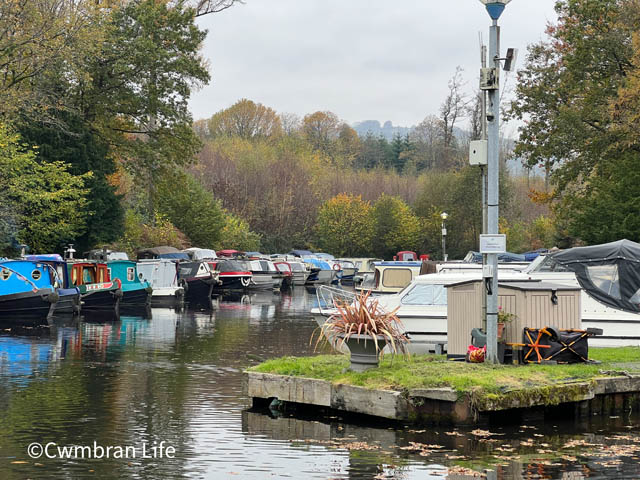Senedd members added their voices to a 14,000-strong chorus of calls for urgent action to avert a “catastrophic” drying out of the Monmouthshire and Brecon Canal.
The Senedd debated a 14,016-name petition calling for action to preserve the 225-year-old Mon and Brec – “one of the most picturesque and tranquil waterways in the UK”.
The Canal & RIver Trust (CRT), which runs the canal, warned of a water shortage in March before agreeing an emergency supply costing the charity £250,000 between April and June.
But campaigners remain concerned about the longer-term future of the canal, which winds from Brecon to Newport through the national park and attracts three million visitors a year.
The CRT relies on water abstraction to supply the canal, with up to 90% coming from the River Usk, and held exemptions until 2018 when regulations on licensing changed.
‘Unsustainable’
Natural Resources Wales (NRW) oversees licensing, limiting the volume of water that can be abstracted on environmental grounds to protect special areas of conservation.
Leading the debate on July 9, Labour’s Carolyn Thomas told the Senedd: “The licence from NRW allows a lower level of extraction than has historically been allowed. Within 10 days of these regulations coming into force earlier this year, there was a problem.”
Ms Thomas, who chairs the Senedd’s petitions committee which visited the canal a few weeks ago, said: “They [CRT] have calculated that if the licence water restrictions had been in force in the last 20 years, the canal would only have been open for four summers.”
She described paying for additional water as unsustainable, calling for a longer-term solution and certainty beyond the current one-year agreement with Dŵr Cymru Welsh Water.
Ms Thomas told Senedd members: “It also means money is not available for the vital maintenance… to ensure the canal remains navigable and leaks get fixed.”
‘Unthinkable’
She said: “The canal has a 200-year legacy and is a strategic piece of our national infrastructure. It is a tourist attraction, flood defence mechanism, biodiversity haven, an arm of the active travel network, a home to people and businesses – it cannot be allowed to fail.”
The petitioner, Jan Butler, a Conservative councillor for the Goetre Fawr ward in Monmouthshire, wrote: “Without a daily supply of water through its locks the canal will quickly become inoperable and closure will be inevitable.
“The consequences to the livelihood of our communities, natural environment and local economy are unthinkable. An unmanaged canal can lead to catastrophic failure and destruction of properties in its path.”
James Evans, the Tory Senedd member for Brecon and Radnorshire, similarly warned the canal is on the brink of closure due to NRW’s “unworkable” decisions.
“The canal’s future is hanging by a thread,” he told the Senedd, pointing out that the CRT does not pay for water elsewhere in Wales and England.
‘Destruction’
Mr Evans said water levels significantly fell within two weeks of the licence coming into force in March, with the CRT making clear it cannot afford to spend £1m a year buying water.
He warned: “If nothing changes, we’ll see hire-boat businesses going under, we’ll see tourism businesses drying up and we’ll see people lose jobs, pubs and shops lose trade.”
Plaid Cymru’s Delyth Jewell said: “The fact the canal was on the brink of total destruction is a reflection of how prone we are to neglecting our heritage and landscapes. And it is a powerful and visible reminder of the price that is paid as a result of the climate emergency.”
Criticising a “disappointing” response, she told the Senedd: “It is one that ignores the reality that is within the government’s gift to at least review NRW’s relevant licensing requirements.”
Peter Fox, the Tory Senedd member for Monmouth, said the CRT has pledged to buy water until March 2026 but “no charity can commit to continuing to do that forever”.
‘Existential’
Welsh Lib Dem leader Jane Dodds warned of an existential crisis. “The decision to prioritise one habitat over another has created a false and deeply damaging dichotomy,” she said.
“It should not be a zero-sum game – the [River] Usk and the Mon and Brec are not rivals.”
Huw Irranca-Davies, the deputy first minister and a former UK minister responsible for canals, stressed that responsibility is shared between Wales and Westminster.
Mr Irranca-Davies said: “If there was an easy answer, we’d have done it already. It isn’t an easy answer, what this will require is bringing people around the table together.”
He told the Senedd: “It’s not one or the other: we need to find the solutions for the canal while also protecting the ecological status of the Usk.”

